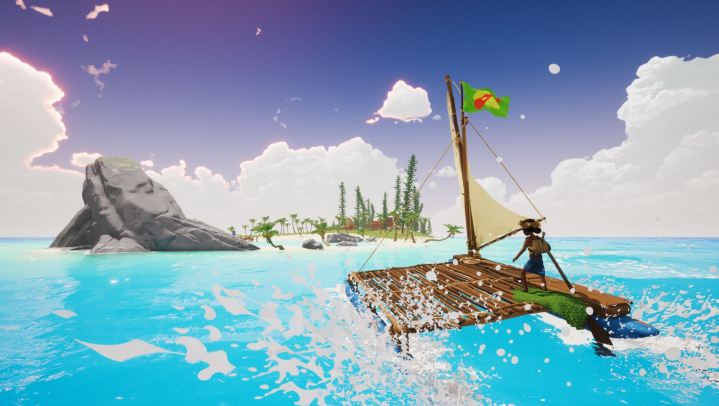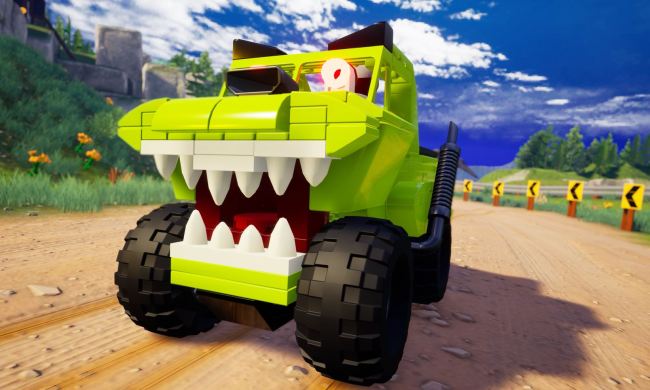“Tchia pays tribute to New Caledonia with a gorgeous open-world game that takes the right notes from Breath of the Wild.”
- Relaxing exploration
- A great tribute to New Caledonia
- Vibrant visuals
- Delightful soundtrack
- Limited soul jumping
- Linear opening is slow
When The Legend of Zelda: Breath of the Wild was released in 2017, it kicked off a new age for the open-world genre. Rather than dropping players into a world and giving them a map cluttered with icons to chase, it encouraged a more freeform style of play that wouldn’t be matched until Elden Ring. While big-budget games have slowly adopted some of its ideas, indies like Sable carried the torch with unique visual styles, settings, and a willingness to take risks. Now, we have another game joining that growing list of games that have made the most out of Breath of the Wild: a standout indie gem called Tchia.
Inspired by the real world New Caledonia, Tchia is a beautiful game that allows me to explore and experience a moving coming-of-age story in an archipelago I wouldn’t have learned about otherwise. On top of that, it’s an open-world game that takes all the proper lessons from Breath of the Wild and isn’t afraid to let the training wheels off and let players explore. Even with its under-baked animal and object possession gameplay system, it’s the best open-world game I’ve played since Sable.
If you only have time to play one more open-world game before The Legend of Zelda: Tears of the Kingdom comes out, make it Tchia; it’s a new video gaming coming-of-age classic.
A tribute to New Caledonia
Tchia follows a young girl (the titular Tchia) as she tries to save her father from the humanoid woodworm god Meavora and his militant accomplice Pwi Dua. Along the way, she grows up as she explores the world around her, meets new people, falls in love, and gains supernatural powers. It’s a straightforward coming-of-age story, but one that’s elevated by an earnest tone and real stakes.
You’ll love how Tchia pays tribute to the Pacific archipelago of New Caledonia.
While mostly kid-friendly, Tchia isn’t afraid to occasionally have some darker moments and actions with real consequences. In an era where many video game characters can feel like they have plot armor and are either edgy or overly comedic, Tchia’s straightforward but sincere narrative is refreshing. It represents a fascinating country and culture that doesn’t get much attention from the wider world as well.
If you appreciate the virtual tourism video games can provide, then you’ll love how Tchia pays tribute to the Pacific archipelago of New Caledonia. Some fantasy and lore elements of the game quickly make it clear that this isn’t real-world New Caledonia, but that doesn’t take away from the cultural representation. The islands players can explore in this game are truly beautiful, with vibrant colors and varied wildlife that all feel like they were crafted to make New Caledonia as appealing as possible.

That love for the location carries on as you play, as Tchia features many real landmarks from New Caledonia and lets players control much of the wildlife that lives there. It’s reflected in the sound design too, with characters played by actors from New Caledonia speaking its native language. The game’s soundtrack is full of unforgettable songs with a New Caledonian sound we’ve never seen in other video game soundtracks. It’s even given the spotlight in multiple rhythm-game-like segments and the game’s Ocarina of Time-like Soul Melodies that can be evoked with a fully playable ukulele.
If you liked games such as Mulaka, Alba: A Wildlife Adventure, or Never Alone that embrace, promote, and educate the cultures they are inspired by, Tchia gladly joins their ranks. Its story is compelling, and playing this makes me want to learn more about and hopefully visit New Caledonia one day.
A tribute to Breath of the Wild
Tchia is an open-world game with very few roadblocks for players. Taking some inspiration from titles like Breath of the Wild, players can run, sail, swim, and climb across each island and the ocean between them however they please, with the only limitation being a stamina system. While traveling from objective to objective, players will come across lots of trinkets they can pick up, races to complete for trophies, rock balancing challenges to learn new Soul Melodies, and other items like Stamina Fruit that increase the player’s stats.

Rather than feeling like a to-do list of activities, Tchia succeeds at making most of its open-world collectibles feel worth pursuing. Each collectible has some use, whether that be a currency, a new outfit, or a gameplay upgrade. Exploration is always manageable as this open world isn’t that big. As games have gotten bigger and bigger, open-world games can feel quite bloated, sacrificing the memorability of particular areas, so players have a vast enough space to explore. By honing in and refining the design of the game’s two major islands, Ija Nöjand Madra Nöj, and all of the smaller ones surrounding them, Tchia stays small in scope enough to where the entire open world will become recognizable to you.
That’s a good thing too, as Tchia’s map system never tells players exactly where they are. While a compass that shows pinned locations and objectives is helpful, players can remove all of that UI if they want to. This approach made me appreciate the beauty of the Tchia and the elegant design of its open world. It’s one thing the game even has over the much larger Breath of the Wild or Elden Ring. I’m more likely to replay this if I want a quick fix of this new-age approach to open-world design rather than restarting and inevitably not finishing one of those bigger games.
The simple act of moving around is delightful in Tchia.
To get the most out of it early, I recommend seeking out as much Stamina Fruit as early on as you can because that’ll ensure you can spend the most time possible with Tchia’s satisfying movement. She can climb pretty much any surface, fling herself forward from trees, and glide through the air with a leaf. The simple act of moving around is delightful in Tchia, putting me in a flow state enhanced by the sublime landscapes and a fantastic soundtrack.
A tribute to ambitious games
While there’s so much I love about Tchia‘s core, certain parts of it don’t benefit from its smaller scope. That’s most apparent in its underdeveloped Soul Jumping system, which allows the hero to possess animals and objects. The idea neatly ties into New Caledonian mythology, according to the developers, and the number of things players can take control of is impressive. Unfortunately, that ocean of possibility is as deep as a puddle. While there are objects and animals everywhere for players to take control of, the only ones that are ever required for progression are flammable ones (or a late-game summon) to damage enemies, dogs that can dig, and crabs that can break chains and locks.

In situations that require these, I usually found the required possession very close or already had learned the Ukelele melody that let me summon what I needed. This reduces a reactive gameplay system to a “spawn what you need” use case. There’s the potential for an immersive sim-like system to complete objectives that could compound nicely with the freedom of its open world. Tchia doesn’t quite get to that level, and I found myself possessing less and less as the game went on. It’s just one area where the limits of the developers’ ambition catch up to them.
Tchia also works much better in its open-world sections than in its linear moments, but it takes a couple of hours for it to truly open up. That slow makes it a little hard to immerse in at first, though, it’s easy to sink in once you’re let loose in the world. Thankfully, the story is engaging enough to make that opening work, and there’s a solid accessibility feature that lets players skip gameplay segments to alleviate any pain points.
When Tchia clicked for me, it fully captured my heart.
My experience shined the most when I would pin an objective, leave no UI up but my compass, and have as much fun as possible while trying to get there by flinging myself from tree to tree, possessing animals and objects, and picking up any collectibles along the way. Coupled with the excellent soundtrack and pretty visuals, it was easy for me to lose track of time as a freely explored. When Tchia clicked for me, it fully captured my heart.
The vibes ultimately outweigh some rough edges and underdeveloped possession mechanics. Its setting is creative, unique, respectful, and reflected in its characters and soundtrack. Like Sable before it, Tchia shows that indie teams can punch way above their weight and deliver open-world experiences that provide worthy alternatives to the more “grown-up” titles that inspired it.
Tchia was reviewed on PC via the Epic Games Store.





